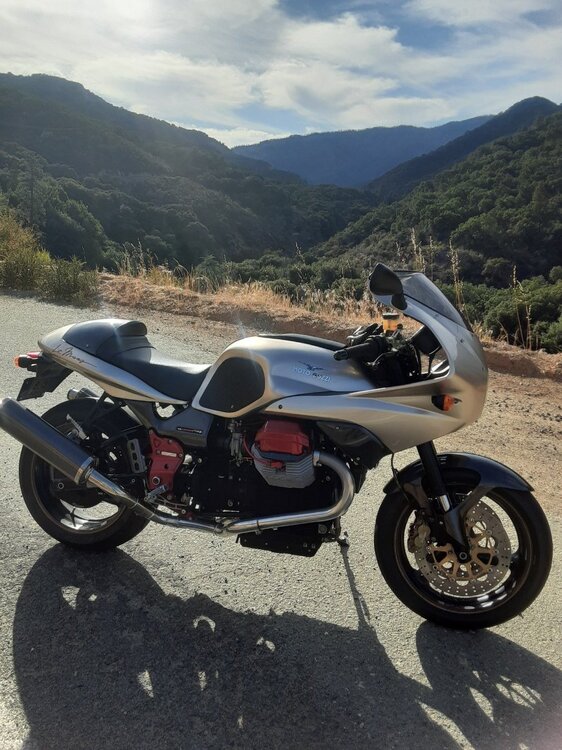Leaderboard
Popular Content
Showing content with the highest reputation on 09/22/2025 in Posts
-
Absolutely ! SamP forgive our zeal but we want you to get this fixed and operating correctly. Moto Guzzi will make you an electrical tch whether you want it or not !3 points
-
I think: cigars all around. I cannot imagine another online community with this much enthusiasm dedicated to helping another member solve a problem.3 points
-
For the fools, including myself, who follow the owner's manual, but occasionally check for updates out there, and I include looking at cars as well, not just motorcycles. So far at 60K miles of use, the Norge hasn't blown up yet due to improper oil usage! Based on official documentation and owner discussions, Moto Guzzi has not changed the oil recommendation for the 2008 Norge. The manufacturer's specification has remained a high-quality 10W-60 synthetic motor oil. The original recommendation At launch, the official factory recommendation for the Norge was Agip 4T full synthetic 10W-60 oil. The reasons for this specific viscosity include: Air/oil-cooled engine: The air-cooled V-twin engines run hotter than liquid-cooled counterparts, and the 10W-60 weight helps the oil maintain its viscosity under high thermal stress. Higher film strength: The engine has specific characteristics, such as a dry clutch, that necessitate a high film strength oil for longevity. Updated guidance While the fundamental recommendation has not changed, the brand of oil has. Since the original Agip oil is now more difficult to find, Moto Guzzi recommends the equivalent Castrol Edge 10W-60 synthetic for its modern big-block engines. Considerations for older models Some owners of older Norge models have noticed changes in oil API (American Petroleum Institute) ratings over time. Specifically, some older formulations of Agip oil had a more desirable SG rating. Because newer formulations may have different ratings, many owners prioritize finding a quality 10W-60 synthetic oil with a higher concentration of zinc and phosphorus to protect the valve train. However, the 10W-60 viscosity remains the most critical specification.3 points
-
2 points
-
2 points
-
Thanks, Phil. I'm aware that what is in the owner's or workshop book isn't likely to be the absolutely ideal option. Too many factors involved, and born out by having seen different recommendations for the same bike in different translations of the workshop book. To be quite honest, I'm also not looking for the absolute best solution for each of my bikes, but rather a solution that will cover all of them adequately. The old Guzzi bulletin seems to confirm that I can get away with one weight for all three. The reason is very simple: I don't have room to be keeping supplies of different oil for each motor and gearbox, and I also honestly can't be buggered. If I can find one that fits all without any of them exploding, I'm happy. I know that wont appeal to your engineer's sense of what is right, but I believe I'm justified in seeing myself to be following "the guidance for the wise", i.e. I consider it to be an informed decision. Hope I'm right.2 points
-
Oh crap, Relay 2 was not installed, sorry about that. Will reinstall the relay first thing tomorrow, and redo the voltage tests on the blue wire, as well as the red/black wire from the harness. Stay tuned and thank you again.2 points
-
It’s written there on the receipt and the service book is stamped. I can think of no reason why it would cause a problem and the vehicle has an unlimited Km, seven year warranty. By the time it expires I’ll be 76 or dead! Probably the latter, so really, at the end of the day I don’t give a shit.2 points
-
You're right! The greenies got a lot of attention, especially two side by side. That color in the sunlight is stunning.2 points
-
Here is the @Kiwi_Roy rendition ( hosted on @Weegie's dropbox ): https://www.dropbox.com/scl/fo/no8adkie1sl6frnc2qmm8/ALzrUXsngCqMRtfMR1cXedE?dl=0&e=1&preview=Guzzi+Wiring+-+Simple.pdf&rlkey=8x5byzd4ux3107610i22ig5v6&st=3xbx7rbu1 point
-
From Carl Allison [ @callison ] on thisoldtractor . . . What is not correct on this diagram is the the reference/warning circuit wires from the regulator are white and black then change, at the flat "SAE" connector, to blue and red/black. https://www.thisoldtractor.com/guzzi007/pdfs/1999_V11_sport.pdf1 point
-
" recommendation for next steps " . . . For starters, I am going back over all of the outcomes. Like @audiomick, I suspect a high resistance problem (bad/corroded connector) in the mix. I suspect this is in the "voltage reference"/warning light wiring. The oil light issue may be a clue. @Sam P, can you pull the connector from the oil switch and ground it (KOEO) to see if the oil light illuminates?1 point
-
I have said this once before. I think EVERY V11 has their own wiring harness and ign. key.1 point
-
@Sam P I was away over the weekend. Reading over what has been posted in the last couple of days, it seems you don't always know why you are measuring what people suggest. I made rough and simple sketch of the charging circuit, in the hope that it will confuse you even further maybe help a bit. Hope that helps you understand what is going on.1 point
-
And that is with all of the relays installed? That harness red/black is the voltage reference to the regulator's black (input) wire. Should be battery voltage coming out of Relay#2 . . . edit: Both the blue and especially the red/black wires look rather kinked going into the back of that connector. If they are straightened, or "wiggled", does the voltage change?1 point
-
I would take/post pictures but I can't hold a camera, light wiring harnesses correctly and press the button at the same time !1 point
-
SanP , on my red frame the two red wires form one pin and they go into the red/green wire on the bike. The black wire goes down and grounds to the regulator mount.1 point
-
OK tomorrow morning I'll reconnect the original reg ground (leaving my new one in place) and inspect the main ground from the gearbox all the way to the battery. Then I'll see the charging and oil light come on when I turn the key. I also may fire it up and take a 5 min ride around the neighborhood to see if anything has changed. If not I'll pull off the tank. Stay tuned, and thank you again for all of your help!1 point
-
Okay, voltage reference wire is intact, then. What are the two wires truncated (nutted) in the image? Red-green would be the charging back to the battery through Fuse#3 you bypassed. But the black wire? Even with the case grounded to the timing chest, there would be nothing wrong leaving that regulator ground connected to the battery negative terminal.1 point
-
1 point
-
Took our new Hyundai in for its first oil change/10,000km service last week and they stuck a 10/30 in it rather than the 0/20 specified. My only concern was if it blows up will they honour the warranty? Since it’s all done through the ‘Official’ network they’d damn well better! I have ZERO interest in doing anything to this vehicle beyond topping up the screen washer bottle so if it shits itself and there are any issues it’ll be off to the courts toot-sweet!1 point
-
Funny how in a field of exotica the V11 stands out....especially the greenies! Cheers1 point
-
I wonder if you lift gently on the bezel while loosening each screw a little at a time that it will slowly come up and off. It would be nice to verify the bulbs are good and get some Caig DeOxit on the contacts.1 point
-
1 point
-
1 point
-
Victory! The first row of bikes to show up were all Guzzis! Then later some other Italian brands showed up. Sent from my iPhone using Tapatalk1 point
-
Those screws pass through the mounting plate and thread into the plastic housing below (may have brass inserts, don't have it in hand) but you probably feel the plastic housing dropping away, which you can't see.1 point
-
Not so much, really. Unsealed, liquid lead acid needs more float than AGM or VRLA but it's hard even to find those in 12v anymore, usually they're 6v deep cycle. https://batteryuniversity.com/article/bu-214-summary-table-of-lead-based-batteries1 point
-
True, but VRLA, so the voltages are higher overall. Plus, the Odyssey apparently has some specific charging parameters. Especially either regard to "trickle chargers.1 point
-
1 point
-
lol those things are not mutually exclusive. Lard, FWIW, was traditionally used to lubricate wooden wheel axles. So eating lubricants isn't off the table. No pun intended but I'll take 'em where I find 'em. Maybe that hovering dictatorial moderator will put these posts in a "Tin Foil Hat" thread.1 point
-
OMG . I used to have to listen to this enlightened idiot that used to tell the margarine/submarine lubricant story all the time. He was the only one of us that was "in the know" and we were a bunch of banjo playin' hillbillies .1 point
-
The oil light concern is to verify the status of the circuit. Disconnect the oil press. switch wire and touch it to a good ground . With the KOEO the light should come on. If it does that is good and the other side of the gen. , oil light & low fuel light circuit is good. You make dann certain you are making good connections when you are testing for B+ and B- on anything. Use a good test light with a conventional bulb. As in NO LED bulb. There is a reason. The battery V has to do with the fact if it is AGM or lead/acid or a gel-cell battery. An AGM fully charged battery has around 12.8v and a lead acid has 12.65v.1 point
-
History is always fun, funny, and maddening. Lard is good. (From Snopes.com my fav propaganda site) "Crisco wasn’t invented by or for the German Navy, or for the purpose of lubricating submarines. Hydrogenation, the process by which Crisco is made from vegetable oils, was invented by German chemist Wilhelm Normann in 1901. Whether Crisco or similar products were ever used as submarine lubricants remains undetermined." "Wilhelm Normann, eventually sold his patent to Procter & Gamble for use in the food market."1 point
-
Oil light should come with the ignition, prior to starting and extinguish almost instantly on start-up. At this point, your battery is really flat and should be charged. If it's a Hawker Odyssey at 12.3v, perform a proper "conditioning" . . .1 point
-
Yesterday I checked and cleaned all the battery connections and they are good. My F3 is now bypassed with a new 10AWG wire - with inline 30A fuse - from battery + to the two red wires at the regulator.1 point
-
It is sad to see what these bikes sell for. you try to sell and no one wants them even though you poured plenty into them. Not unlike a Mary Kay Cadillac.1 point
-
friends around here say we have two seasons. Riding season, and building season.1 point
-
We're just all working together, my friend. You are doing a great job reporting back what you find. If we cannot find a bad connection somewhere, the new regulator will, indeed, be suspect as faulty.1 point
-
Kind of Black, silver, red, greenie ++. Cool bikes, and have l mentioned the engines before, YES l have [emoji16]. End of season up here. Cheers Tom. Sent fra min SM-S906B via Tapatalk1 point
-
Wow, thank you. I am indeed a novice! Will look into this tomorrow.1 point
-
Well its in the back of the van so I guess well know more in the coming days. Will give it a good once over and get a few miles on it and see how it goes. Thanks1 point
-
The black wire of that connector is the "voltage reference" from Relay #2 ("Headlight Relay") and should have no output from the regulator. The harness side of the black wire should be near battery voltage with the key on. The white (or lighter) wire should ground through the warning bulb. An ohm meter through the harness side of the lighter colored wire should show continuous to ground. Also, a test light from the positive terminal should light when connected to the harness side of the white/lighter colored wire (which should also illuminate the warning light).1 point
-
1 point
-
Just a thought. I have a set of covers from a 2003 Rosso Corsa. They are somewhat faded, as are many of the ones in photos I have seen. The color seems 'off' from what was possibly intended anyway. Was it intended to be the same as the Mandello tank? My point is, not unlike many of the (varying) red side plates, the paint or anodizing is often unreliable. If you can't find fairly NOS, I would get 'whatever' color parts and have them done to suit.1 point
-
That's actually my first go-to if it's available where I need it. That's in the Bimmer at the moment.1 point
-
That housekeeping done (y'all carry on with that Texas bid'ness! ) . . . I have to tell this South'n Spine Raid story, lest it fade away . . . Late night in the Tellico Garage, the question of "Why a Guzzi?" came up. One revered SpineRaider spoke up ( I paraphrase, but not entirely!) . . . "I was always a Ducati guy and hated Guzzis ." >hated<. "One day I was at my dealer and walked by a SPOrT 1100 from behind. I squatted down and looked at it from behind. " "It was like your girlfriend bending over in some hot shorts. " Some quick-witted SpineRaider noted he said: YOUR girlfriend, not HIS girlfriend . . . Either way: he's been a Guzzi guy ever since.1 point
-
I use Mobil-1, too. Not in my motorcycles. Where do they declare their actual base oil? If the base oil is not Group 4 or Group 5, the motor oil is not "full synthetic" in spite of the marketing statement on the face of the label. I've abandoned popular oils because the manufacturer will not provide the specification if the base oil.1 point
-
Has anyone just ran flat 30W oil for an oil change in a CARC bike and noticed any difference in performance? In the garage for the various cars, I have a collection of Advanced Full synthetic Mobil 1 10W-30, 20W-50, 10W-40, 0W-40 and of course 10W-60, all full synthetics. I'll try some experiments on using them in the Norge over time and see how the bike feels/behaves. Good to know there are these options available1 point
-
1 point












